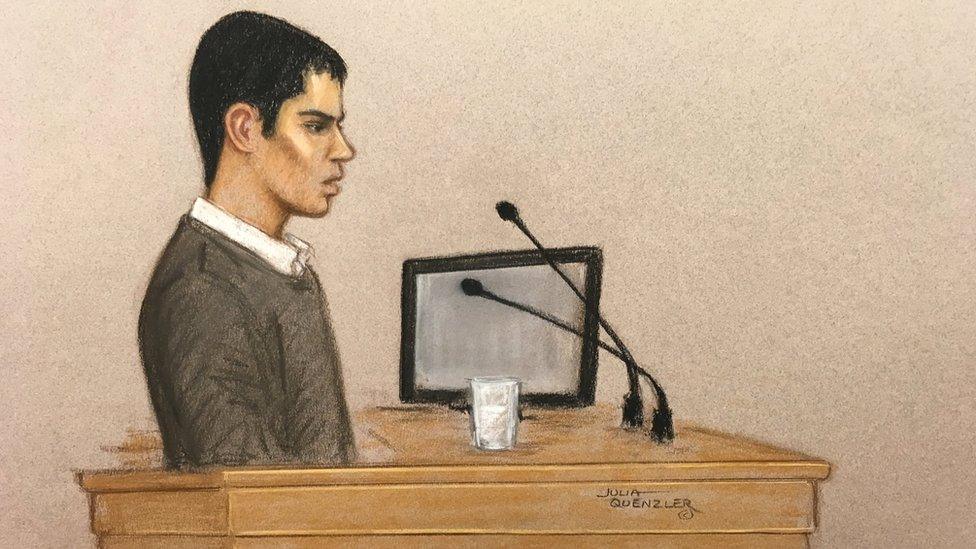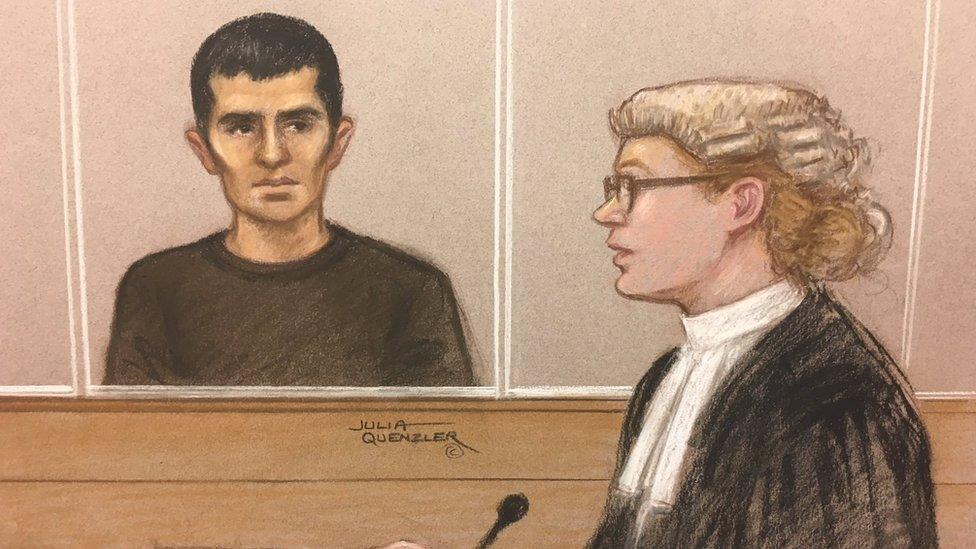Parsons Green: Tube bomb accused 'moved by hatred of UK'
- Published

Ahmed Hassan was motivated by hatred of the UK, the Old Bailey heard
The man accused of the Parsons Green Tube bombing was moved by "anger and hatred" when he planted the explosives, the Old Bailey has heard.
Prosecutor Alison Morgan said Ahmed Hassan blamed the UK for his father's death in Iraq and he "left nothing to chance" in the attack's planning.
His actions were "designed to cause death and destruction", she said.
Mr Hassan, 18, denies attempted murder and causing an explosion likely to endanger life on 15 September 2017.
He told his mentor college lecturer Kayte Cable that it was his "duty to hate Britain", the court heard.
He had also told the Home Office he had been "trained to kill" by the so-called Islamic State group, when he claimed asylum in 2016.
In his evidence on Wednesday, he said that was a lie and he only wanted to cause a fire and not an explosion by planting the device on the Tube train.
'Calculated and clever'
In her closing speech, Ms Morgan said: "He (Mr Hassan) may have been troubled by events in his past. He may well be motivated by circumstances he may now not admit to you.
"What he did that day was an act of anger and hatred designed to cause death and destruction of property."
She continued: "It is a matter of luck that there was not a full explosion that day, not because of any deliberate intention on the part of the defendant to cause just a fire."
CCTV of Parson's Green Tube bomb fireball
Ms Morgan replayed CCTV footage of the fireball passing through the carriage, saying passengers had been "terrified", with some suffering serious injury.
She asked jurors to imagine what would have happened if 400g of TATP explosives had fully exploded, sending 2.2kg of screwdrivers, knives, nuts and bolts flying at high velocity.
"Whatever story he tells you in the witness box, the fact that he was angry with this country was clear to those who met him, especially Ms Cable... he described it as his duty or right to hate this country and he blamed this country for the death of his father," she said.
She said Mr Hassan had lied in his evidence, when he said it was all part of a fantasy and an act of boredom.
Ms Morgan said: "He may well have lied to all those people for two years but he may well also be lying to you.
"Lying to you about the truth of his past with Islamic State for the obvious reason that if he was trained to kill by IS that would tell you something about his mindset and who he really is and where he has really come from.
"You can be sure it was not an act of attention-seeking or boredom. This was someone who wanted to cause death and damage and make good his escape."
She said Mr Hassan was "calculated and clever" in his preparations and when he looked up the news on the BBC website afterwards, he was not reassured that it was a minor incident, as he claimed.
It was how he found out that he had "failed" in his intention, she said.
'Troubled'
Defending, Tim Moloney QC told jurors that those who knew Mr Hassan saw a "sincere, positive boy".
He said Barnardo's staff said he was a "very polite" young person "seeking help, looking forward to the future".
Mr Moloney said Mr Hassan had gone from being a "troubled young man" to doing well at college.
He said: "It seems to me the prosecution suggest there may be truth that maybe he was with IS and it's possible we may never know.
"That's not good enough for me. We say that if he was with Isis (Islamic State), would he have said that and raised that potential with the Home Office and draw attention to himself in that way?
"If he was with Isis he would have had many opportunities to do what he wanted. Making TATP is a really straightforward process that can be done in a day."
The trial continues.
- Published13 March 2018

- Published12 March 2018

- Published9 March 2018

- Published8 March 2018

- Published7 March 2018
